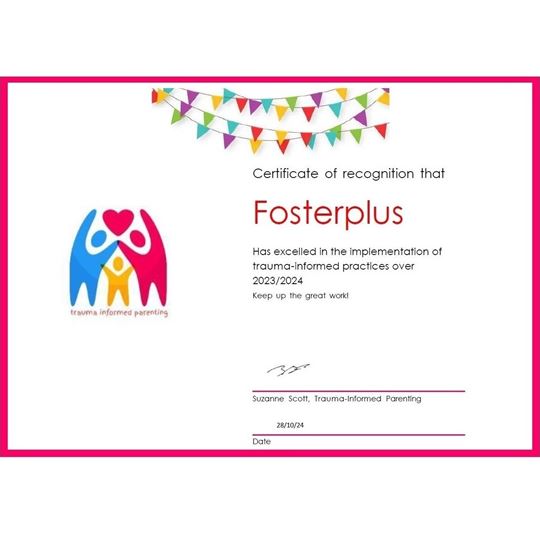The Trauma Informed Parenting Charity have awarded Fosterplus with a certificate of excellence, for our outstanding commitment to trauma-informed practice within our service.
Over the past two years, our team at Fosterplus have been dedicated in implementing trauma-informed practices across the service we provide to foster families. We have been transforming the support we offer to foster carers and their children, providing training workshops on trauma informed parenting, and integrating trauma awareness – along with carefully considered language – within practice, guidelines and documentation.
To reinforce our practice, and ensure that our teams are supported with this important approach, we have also been providing ongoing support sessions for staff to connect, talk, and reflect on their work. Fosterplus are fully committed to maintaining a positive and compassionate service, and we are thrilled to have received this award.
The Trauma Informed Parenting Charity commented that “The impact of Fosterplus’s commitment will be tremendous, creating lasting improvements in practice and support for both foster carers and children alike. We couldn’t be prouder to recognise Fosterplus for their inspiring work over 2023/2024 towards a safer, more understanding future for every child”.
Head of Operations, Chrise Grundy Hoban, shared that “Fosterplus are truly honoured to receive this award. The Trauma Informed Parenting Charity have been amazing in providing such a high standard of training to our staff and foster carers, as well as reflective sessions for staff. This award is a testament to the incredible hard work from our foster carers and staff, who have all continued to provide safe, caring and stable environments where our children and young people can fully express their emotions and be supported and enabled to achieve the best outcomes in their lives‘.

Trauma-informed practice in fostering: Supporting children with compassion
Trauma-informed practice has become essential in fostering, offering a sensitive, supportive approach to help children who have experienced trauma heal and feel secure. Understanding trauma and how to integrate trauma-informed care into daily interactions can help foster carers create a nurturing environment where children can rebuild trust and resilience.
What is trauma-informed practice?
Trauma-informed practice is an approach that recognises and responds to the effects of trauma on a child’s behaviour, emotions, and relationships. It involves understanding that past experiences – such as neglect, abuse, or instability – can shape a child’s responses, often in ways that may seem challenging to others. In fostering, this means approaching care with empathy and an awareness that behaviours that may be considered challenging may stem from difficult past experiences rather than intentional actions.
How does trauma-informed parenting help children in care?
For children in foster care, trauma-informed care offers stability, security and understanding, which are fundamental for healing. By recognising signs of trauma and responding with compassion, foster carers can help children feel safe and supported. Some ways that trauma-informed care helps children and young people are:
- Building trust: Consistent, caring interactions help children learn that they are safe and can rely on others.
- Reducing anxiety: By avoiding triggers and using calming strategies, foster parents can create a peaceful environment that helps reduce trauma-induced anxiety.
- Encouraging positive coping skills: With a stable environment, children can learn healthy ways to handle difficult emotions; laying a foundation for resilience.
Tips for foster carers to integrate trauma-informed practice
1. Create a safe environment
Stability is so important for children and young people. Keep routines as consistent as possible to help children feel secure, and communicate changes in advance. Make sure they have a designated space that’s just for them, where they can feel safe and relax.

2. Practice empathy and patience
Trauma can often lead to behavioural outbursts or withdrawal. For foster parents, it is crucial to approach situations with empathy; seeing their actions as communication of unmet needs. Asking the question “what might be behind this behaviour?” is helpful, instead of focusing on the behaviour itself.
3. Encourage open communication
Let children know it’s okay to share their feelings without judgment. Listen to their experiences, and acknowledge their feelings, regardless of whether they’re big or small.
4. Help manage emotions
Teach young people coping strategies for dealing with strong emotions, such as deep breathing or taking a moment to step back. Model these behaviours yourself to show that it’s okay to feel and manage emotions healthily.
5. Seek support when needed
Always ask your social worker if you need any help or advice. Fosterplus provide extensive support to foster families, as well as providing access to therapy services and staff who are trained in trauma. You can also attend personalised training, such as on behaviour support and trauma-informed parenting, and attend support groups with other families who are having the same experiences.
Adopting trauma-informed practices in foster care can transform a child’s experience, helping them find comfort, trust, and hope in a supportive environment. As a foster carer, your understanding and empathy can be the first steps toward healing for a child who has faced trauma, and the first steps towards changing their life.
If you’d like to find out more about becoming a foster carer, please get in touch with our team.
You may also find interesting…
Can’t find what you’re looking for?
By Phone
One of our team is available to talk to you over the phone to answer any of your fostering queries.
By Email
You can get in touch by filling out our online enquiry form with any queries that you may have.
Visit an office
Find contact details for your local office team. We’re always happy for you to pop-in and chat.





